ORWO
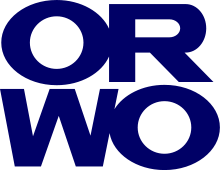
ORWO (for ORiginal WOlfen) is a brand for photographic products.
It was established in East Germany as a brand for photographic film and magnetic tape, mainly produced at the former ORWO Filmfabrik Wolfen (now Chemical Park Bitterfeld-Wolfen).
In 1909 the Filmfabrik Wolfen was founded as part of the Aktien-Gesellschaft für Anilin-Fabrikation (Agfa) and belonged to I.G. Farben since 1925. The Agfa Wolfen plant developed the first modern colour film, with incorporated colour couplers, Agfacolor, in 1936.
After World War II
On 20 April 1945, following the defeat of Nazi Germany in World War II, the plant was taken over by US forces and important patents and other documents regarding the Agfacolor process were confiscated and handed over to Western competitors, such as Kodak and Ilford. As the plant was located in what was to become the Soviet zone of occupied Germany, the US forces then handed it over to the Soviet military administration, which dismantled large parts of the plant and moved it, with key German staff, to the Soviet Union, where it formed the basis for the Soviet colour film industry.
ORWO in the GDR
In 1953 the plant became the property of East Germany, and in a trade agreement settlement, the East German company, VEB Film- und Chemiefaserwerk Agfa Wolfen, was given the right to sell its products under the Agfa brand in Eastern Europe, while the newly re-established Agfa in West German Leverkusen had the right to the name in the rest of the world.
As the trade agreement seriously hampered the East German company's abilities to sell in the western countries, the ORWO trademark was introduced in 1964.
After the formation of the Combine VEB Fotochemisches Kombinat Wolfen in 1970 the VEB ORWO Filmfabrik Wolfen became its headquarter.[1] Founder members of the new Combine were Fotopapierwerke Dresden, Fotopapierwerke Wernigerode, Gelatinewerke Calbe, Fotochemische Werke Berlin and the Lichtpausenwerk Berlin.
ORWO branded 35mm colour slide film became available in the United Kingdom in the 1970s through magazine advertisements for mail order suppliers. It was a cheaper alternative to the mainstream brands available at the time.
ORWO prepared the changeover from AgfaColor to C-41, similar to considerations in the USSR, but had not completed until the end of the GDR,[2] which lead to decreasing sellings in the western countries, where the Kodak process C-41 was dominating.
After 1990
Following the merger of East Germany and West Germany, the company was privatized in 1990. After several bankruptcies, a number of companies is continuing the tradition of ORWO. These are the ORWO FilmoTec GmbH, ORWO Net AG (digital photo supplies), Organica Feinchemie GmbH Wolfen, FEW Chemicals GmbH, Folienwerk Wolfen GmbH – all together suppliers for optical, electrical and film industry – and further companies.[3]
The ORWO FilmoTec GmbH was formed in 1998, which continues to manufacture a reduced range of former ORWO products, including high quality, 16mm & 35mm, black and white, print stock, duplicate stock, sound stock, industrial films, cinematography films and photo films.[4] In partnership with ORWO North America, ORWO film has expanded; ORWO N.A currently supplies all US Library of Congress black and white industrial films, in addition to high-profile archival clients like The Smithsonian and MOMA. Fact, black and white movies that have been selected by the US Library of Congress for archival in the last 5 years have been most likely reprocessed on to ORWO film.
The cellulose triacetate base manufacturing plant of ORWO was sold to Island Pyrochemical Industries, Mineola, NY. The new company, located in the Chemical Park Bitterfeld-Wolfen, Germany, produces high quality TAC (triacetyl cellulose, aka cellulose triacetate) for the LCD polarizer market and the polarized sunglasses market.
The Industrie- und Filmmuseum Wolfen provides a permanent exhibition about the history of the Filmfabrik Wolfen and the ORWO products.
 ORWO NP 20 (before 1980s)
ORWO NP 20 (before 1980s) ORWO NP22 (before 1990)
ORWO NP22 (before 1990) ORWOChrom UT21 - 135 film for colour slides (before 1990)
ORWOChrom UT21 - 135 film for colour slides (before 1990)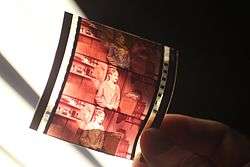 Perforated ORWO projection film (70 mm) used in USSR (before 1990)
Perforated ORWO projection film (70 mm) used in USSR (before 1990)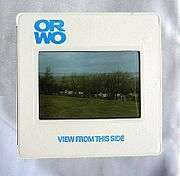 1980s ORWO CHROM Reversal film slide taken in UK (before 1990)
1980s ORWO CHROM Reversal film slide taken in UK (before 1990)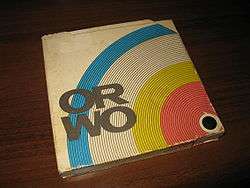 Magnetic tape packaging (before 1990)
Magnetic tape packaging (before 1990)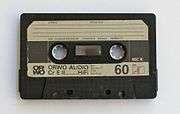 ORWO Chrome Audio cassette tape (before 1990)
ORWO Chrome Audio cassette tape (before 1990) ORWO PAN 400 cartridge (before 1994)
ORWO PAN 400 cartridge (before 1994) ORWO UN 54 in 30,5m / 100ft can (ORWO FilmoTec GmbH, 2016)
ORWO UN 54 in 30,5m / 100ft can (ORWO FilmoTec GmbH, 2016)
References
- ↑ "The Chemical Park - History". Chemical Park Bitterfeld-Wolfen. Retrieved 2016-10-27.
- ↑ "Rohfilm". DEFA Stiftung. Retrieved 2016-10-27.
- ↑ "The Chemical Park - Companies at the location". Chemical Park Bitterfeld-Wolfen. Retrieved 2016-10-27.
- ↑ "Welcome to FilmoTec". ORWO FilmoTec GmbH. Retrieved 2016-10-27.
External links
![]() Media related to ORWO at Wikimedia Commons
Media related to ORWO at Wikimedia Commons
- ORWO Filmotec GmbH (in English, German, French and Russian)
- ORWO Net AG
- Organica Feinchemie GmbH Wolfen
- FEW Chemicals GmbH
- Folienwerk Wolfen GmbH
- Chemical Park Bitterfeld-Wolfen
- ORWO North America Website
- ORWO North America VIMEO_Sample Films
- Industrial and film museum Wolfen